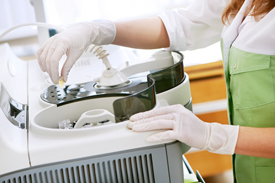Centrifugation is the process of spinning a mixture to separate out its components. Spinning and separating materials in laboratories is now made much easier with new centrifuge models. High-speed centrifuges with an extensive library of compatible rotors will help to accelerate the turnaround time for sample preparation while ensuring sample integrity.
However, proper maintenance of this instrument is crucial to create a safe atmosphere for laboratory workers. It helps to:
- Ensure the accuracy of data
- Extend the life of the system
- Improve the safety culture within the lab
Most accidents with this system are the result of user error. Along with strict adherence to manufacturer procedures, appropriate decontamination and cleanup procedures are also important to maintain safety.
Due to the high speed at which the instrument operates, there is a great possibility that it may injure users if not operated properly. High speed can also result in heat build-up in the system and the specimen. To prevent cell death from overheating, the use of a refrigerated centrifuge, operated at 8-10 °C, is recommended. Under refrigeration, the top of the device should be closed to avoid condensation. Open the instrument only after the signal for end of process is seen.
- Choose a level surface - Change in the surface may also influence the centrifugation process. Make sure that the system is located on a rigid, flat, level surface. It is also recommended to place the instrument away from balances, as they produce vibration.
- Check corrosion - Before use, confirm that the device and the rotors are dry. If there is any sign of corrosion, do not use the system, until the part has been repaired by a qualified service technician. A routine visual check of the rotor is crucial to detect any type of rotor fatigue such as cracks, bulges, or corrosion. Failure to do so will lead to the eventual failure of the rotor and thus significant damage to your centrifuge.
- Maintain routine cleaning - Remember to refer to the manufacturer's instructions for specific information on how the instrument should be cleaned. In case of biological spills, an approved disinfectant must be used to decontaminate the spill. Clean the centrifuge housing, rotor chamber, and rotor accessories with a neutral cleaning agent.
While purchasing the system, ensure the lid have a locking mechanism that prevent opening while the rotor rotates. Also choose corrosion-free metal rotors to enhance the performance and safety.
The system must be serviced annually by a qualified service technician to make certain that the unit operates safely and properly. The service technician must issue an inspection certificate indicating compliance with safety and proper operation. By purchasing the device from a reputable lab equipment supplier in NY, you can benefit from Preventive Maintenance (PM) service and service contracts, in-house service and repairs, and on-going customized support.



